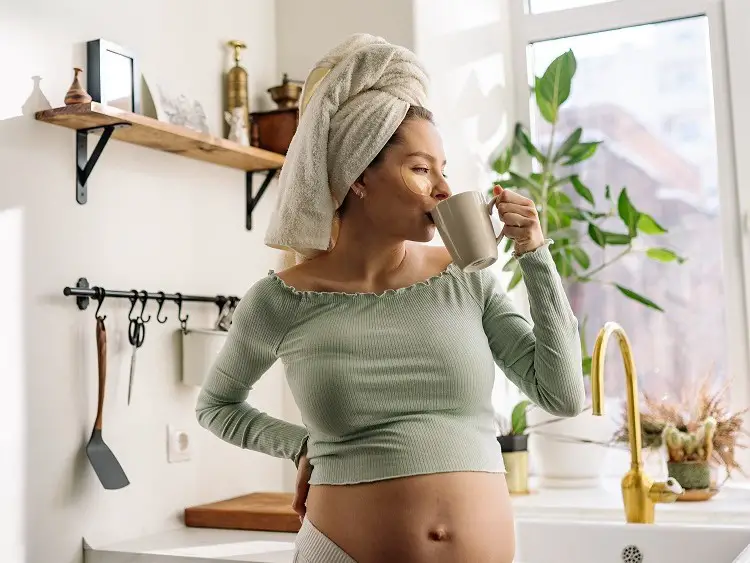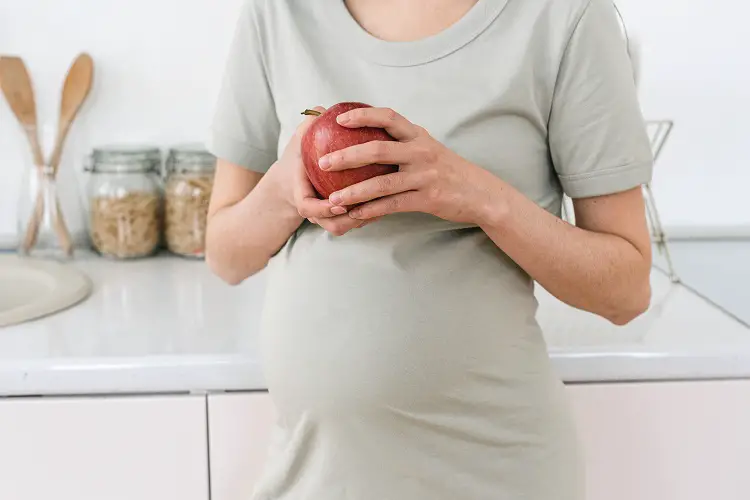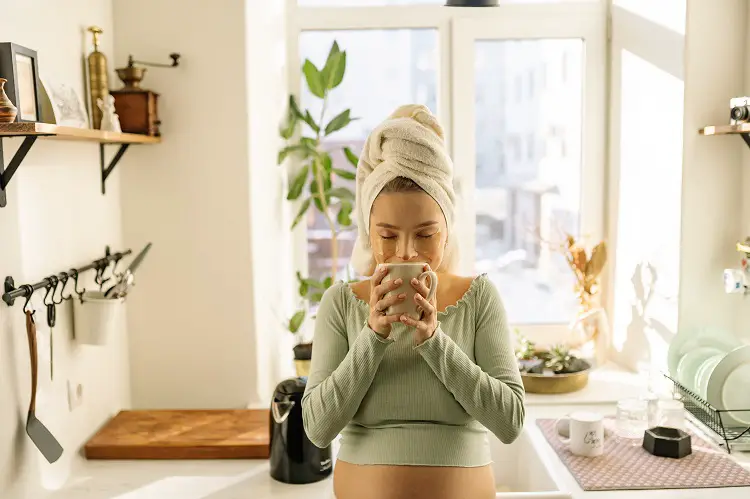To have a taste of mold is not something one would wish for.
Mold can be found anywhere, on slices of bread abandoned for a while, in your butter that wasn’t properly covered, in your cup that you do not regularly use, wherever.
While it is true that ninety-nine percent of pregnant women have weird cravings, some of which are an awkward combination of food, chalk, raw food, and even wanting the smell of food gone bad, it is also almost impossible to see one who craves to eat molds.
This article discusses what happens when you accidentally drink mold while pregnant, what to do, and how to stop mold from growing in your home.
What Happens When We Ingest Mold?
There are so many questions about this subject, and we will do our best to answer them. Mold is not all that harmful to your system.
All thanks to stomach acid, which is strong enough to kill most pathogens. But it isn’t good for the body either.
Common bread mold, for example, isn’t particularly harmful when compared to the nastiest molds, which produce aflatoxin and can cause various types of cancer. This mold can be found in grains mostly.
If you accidentally drank or ate mold from your kitchen, you are safe because your regular household mold is, in most cases, not aflatoxin-related. It most likely contains mycotoxins.
Can’t We Just Cut The Mold Off Our Food?
We are quite sure this question has crossed your mind before. It is normal human reasoning. The first is especially when we discover a mold on something we still love.
This is an unhealthy thing to do. This is because you could still get infected with the way fungal infections spread through molds.
You have to understand that the mold isn’t exactly limited to the spot where you found it alone. It affects the whole thing.
So, What Happens When We Drink Mold?

It would be medically unthinkable to expose yourself to mold intentionally, then stand back and see what happens.
Scientific research was carried out on the health hazards of mold to non-pregnant people, and mold has been associated with allergies, asthma, sinus infection, and rashes. Once in a great while, it can lead to more severe reactions.
For most people with a healthy immune system, drinking mold does not affect them. Well, except it is ingested in very large quantities. Anyone who does this will most likely experience nausea, vomiting, and diarrhea.
Those with weak or not-so-strong immune systems might suffer persistent vomiting, fever, chills, and abdominal pain.
According to EPA (The Environmental Protection Agency), molds have the potential to cause health problems.
They can produce allergens that can cause allergic reactions, irritation, and potentially toxic substances (mycotoxins).
For sensitive individuals, inhaling or touching mold or mold spores can cause such person allergic reactions.
Allergic reactions include hay fever-type symptoms and asthmatic complications in people with asthma who react to mold.
Other symptoms aside from allergic and irritant types have not been reported, and research on mold and its effects on humans is currently ongoing.
What Happens When You Accidentally Drank Mold While Pregnant

People worldwide have told stories of miscarriages from accidentally taking mold.
This veracity can’t be exactly ascertained because there is no scientific backing to it. Most of the stories that linked mold to miscarriage are anecdotes.
Pregnant women are very susceptible to the ill conditions mold brings because of their delicate state. In addition to the conditions mentioned above, they can become very irritable and have rashes all over their bodies.
However, animal studies have shown that taking mold in large quantities can lead to birth defects such as low birth weight, neonatal jaundice, preterm birth, maternal anemia, and the like.
If your pregnancy is in the early stage, it can lead to fetal loss and fetal defects. This is why pregnant women are advised not to entertain any mold in their homes to prevent these possible defects.
Read Also: How To Get Mold Out Of Fabric Car Seat
What To Do After Accidentally Drank Mold While Pregnant
- Check Yourself: It is advisable to observe how you feel just after taking mold. This is the first step to knowing what to do. If you feel nothing, you can relax. However, this shouldn’t stop you from seeing your doctor.
- Speak To Your Doctor: There are many posts online on what to take when you have bad effects from taking mold. Almost everyone has a friend that knows one or two things about the side effects of molds. Don’t let anyone who isn’t a medical professional make you afraid. The best thing to do after taking mold is to visit your doctor. Endeavor to do that. Babies need you to be healthy.
- Hunt For Molds: By hunting for molds, we mean you should check your water, your crockery, your food, and other moist places where they can easily grow. Check these places for mold. Discarding them as soon as they are formed is one of the best things to do. For the crockery, ensure to wash properly so no one would suffer from accidentally taking mold again.
How To Keep Your Food Fresh And Mold-Free

1. Keep your fridge clean
If cleaning isn’t your thing, you should prepare to face any unhealthy circumstances resulting from it. Keeping your fridge clean and mold-free is a vital household chore.
Any little food spillage can grow mold, which results in bacteria growth in our food and drinks.
To control mold growth, the USDA suggests we clean the inside of our fridge every few months using a solution with 1 tablespoon of baking soda dissolved into 1 quart of water and then clean with clean water, then dry.
If your refrigerator is messy and shows some visible mold, we recommend you use 3 teaspoons of bleach in 1 quart of water. Make sure you remove any food item from your fridge before using bleach.
2. Store food properly
A hot and humid environment is a perfect breeding space for mold to grow, so it’s recommended not to leave food out on the counter for too long.
You must cover refrigerated food items with a lid, foil, or plastic wrap. Mold spreads by spores that fly in the air, so we must keep our foods covered, even in the refrigerator.
You should always use your fridge’s crisper bin, as it’s calibrated for the specific relative humidity percentage (about 80 – 95%) that helps keep fruits and vegetables fresh.
3. Make sure you keep your fridge (and freezer) at an appropriate temperature
It is recommended to keep your refrigerator temperatures at 40 degrees Fahrenheit or less, while freezers should always be kept at zero. While you do this, avoid browsing through the fridge. Always keep the door closed.
Opening and closing your refrigerator regularly will only make your refrigerator get warmer and warmer.
Read Also: What Happens if a Baby Eats Mold
How Do We Stop Molds From Growing?
We have compiled a few tips on how to stop mold from growing. To avoid going through one or more of the ill conditions mentioned above. Please follow through.
- Clean your houses with disinfectants containing anti-mold substances. Some disinfectants contain ingredients like hypochlorite, formaldehyde, and hydrogen peroxide, which are very efficient for mold destruction. Always check the disinfectant’s composition before you buy.
- Use air-tight gloves, a face mask, and a hard brush or sponge when cleaning. This ensures your safety and the speedy removal of molds.
- Are there containers you can’t afford to lose? Wash them very well.
- Hot Water Method: This is a great fix for metal bottles. Pour hot boiling water into the bottles, cover them, and let it sit for hours or overnight. Wash thoroughly after.
- Use of Baking Soda: Baking soda is a safe and mild disinfectant. It is very effective for moldy bottles or cups. Add a little quantity to warm water; allow soaking for a few hours, then wash.
- Cover Drinks Properly: They say refrigeration is good for preventing mold. While this is true, it is almost ineffective if you do not cover your drinks or water properly in the refrigerator.
- Wash your grains and tubers properly before cooking.
Related Posts:
Conclusion
If you accidentally drank mold while pregnant, don’t beat yourself up about it too much. Mold growth is very common. This doesn’t mean you are unkempt.
If you visibly find mold in your food, discard it immediately since you’re not sure the kind of mold it is. Is it a mold that can cause toxins that can be very dangerous to you and your baby?
You have the right to feel gross about it. It’s okay. Relax and stroll to your Doctor’s office if you have any of the ill conditions listed above. Everything will be fine. Meanwhile, maintain good hygiene to discourage further mold growth!
